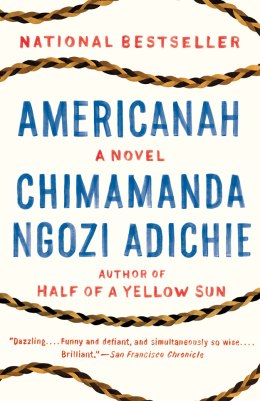
I knew Chimamanda Ngozi Adichie’s name only from the Beyoncé song (ladies, tell ‘em). And so when a close friend recommended earnestly her newest novel Americanah, I expected (so, so whitely) a smart and sharp commentary on race, nothing more. A work of nonfiction dressed up in fictional names. And while commentary is certainly a catalyst of the story, one of its strongest flavors, the novel contains multitudes beyond simply that. It is, at its core, a love story: a tale of well aimed psychological depth and emotional heft, where the characters’ feelings can stack on top of you like steep, rolling hills.
Americanah follows Ifemelu, a young Nigerian woman who moves to America during college; and Obinze, her first—perhaps her only—great love. Ifemelu and Obinze meet in high school and fall for each other, fast and hard, with a precocious kinship of spirit. But after a series of strikes render their educations inert and Obinze fails to obtain an American visa, they must part ways: Ifemelu to America and Obinze to London.
When she arrives in Brooklyn and later attends school in Philadelphia, Ifemelu plunges, deeply and quickly, into the kind of poverty that is not glamorous, the kind of poverty from which you are tempted to look away out of politeness. Unable to work her visa, she scrambles to make rent, gets by on slim rations of rice, and in her lowest hour succumbs to an instant of sweaty, claustrophobic prostitution. This act tips her over into a consuming, isolating bout of depression, an illness of which Adichie writes with devastating, efficient clarity: “[Ifemelu] woke up torpid each morning, slowed by sadness, frightened by the endless stretch of day that lay ahead. Everything had thickened.”
But true to the self-made American narrative Americanah at once employs and critiques, Ifemelu is not defeated so early into her time in America. With increasing momentum, she finds an under-the-table babysitting job, enters a series of intense but mortal relationships, and eventually starts the blog that gains massive popularity and becomes her primary source of income: “Understanding America for the Non-American Black.” Obinze is not forgotten, but far away, suppressed beneath Ifemelu’s shame and regret.
It is hard to imagine that Ifemelu’s blog is not Adichie’s own unadulterated voice, cutting into her prose with unartistic, unpretending frankness. “Dear Non-American Black,” begins one of Ifemelu’s early entries, “when you make the choice to come to America, you become black. Stop arguing. Stop saying I’m Jamaican or I’m Ghanaian. America doesn’t care. So what if you weren’t ‘black’ in your country? You’re in America now.”
But what of Obinze? Though he never makes it to America, he experiences the same level of ontological reduction, the same radical shift in perception that Africans undergo when they move from a nation where race is a non-entity to a nation where race defines them. The passages that follow Obinze through London are not as strong as Ifemelu’s sections, lacking some of richness of detail that we get to enjoy on her American journey, but even so the heart breaks for him.
He scrapes along the city’s underbelly, his status as an illegal resident imbuing him with a constant, survivalist fear that often reduces him to humiliating, animal extremes. When an attempt to obtain citizenship goes wrong and he is thrown into the slow, arduous process of deportation, the unfeeling fingers of the legal system that steer him out of the country reduce him beneath even animal metaphors: “He felt suffocated in that cell, let out only to exercise and to eat, food that brought to mind a bowl of boiled worms. He could not eat; he felt his body slackening, his flesh disappearing. By the day he was led into a van one early morning, a fuzz of hair, like carpet grass, had covered his entire jaw.”
While her ability to cut straight to the reader’s deepest, quietest emotions carves canyons into the reading experience, Adichie shines even brighter in her figurative language. Whether in passages like the above, where a simple focus on the soil and that which grows from it adds entire dimensions to apathy, or in more mundane scenarios, Adichie displays an effortless ability to elevate metaphor from mere decoration to intentional and effective poetic integration. Paragraphs bloom into unexpected and arresting imagery, lingering long and delicious in the mind. One of my favorites:
Ifemelu stood by the window while Aunty Uju sat at the table drinking orange juice and airing out her grievances like jewels. It had become a routine of Ifemelu’s visits: Aunty Uju collected all her dissatisfactions in a silk purse, nursing them, polishing them, and then on the Saturday of Ifemelu’s visits, while Bartholomew was out and Dike upstairs, she would spill them out on the table, and turn each one this way and that, to catch the light.
There is something delightfully luxurious about Adichie’s prose – odd words and phrases so succulent and worth savoring it is as though she chose them for deliciousness alone.
Americanah is replete with moments of clarity, with acerbic criticism that cuts through centuries of bullshit we’ve sold to ourselves. For this extremely white, extremely ignorant reader it was often eye-opening, offering a perspective that had been distanced from me by several layers of privilege and marginalization and laziness.
But where it strikes hardest is the heart, telling above all things a hard-earned love story, one that rewards and punishes in equal measure. It says something of Adichie’ skill (although of course nothing had to be said) that I, a white girl who grew up without having to think once of race, was allowed to sink fully into the hearts of perfect cultural strangers, but never allowed to forget what it is that sets us apart.
Beautiful done Lo. I know who my real friend are by who takes my book recommendations ❤
LikeLike